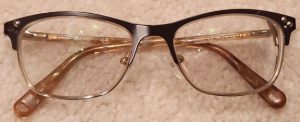About two years have gone by since I rewrote my money story by sending my inner Cinderella away to start a new and happier life in the imaginary village of Channelwood. I’d say that the project was a success because I feel more confident about my finances now. Although my husband and I still have the same jobs with ordinary pay raises, we feel more comfortable talking about money. Expenses seem easier to manage, and in general, we have things better sorted.
Another area of my life that could benefit from revising outdated stories is health. I’ve thought so for a while, but my internal narratives are so jumbled and conflicting that it hasn’t been easy to get a handle on where to start. Objectively, I am in good health: I eat a reasonably good diet, get regular exercise, and have no serious medical issues. For the past few years, though, I’ve felt that my health is not what it ought to be. Annoying, persistent little aches crop up every now and again, for no apparent reason, in various places where I’ve had no injuries of which I know.
Many people would say that after age 50 aches and pains are normal, and I should just get used to that. But I suspect that some of it has to do with cultural expectations of decline—that to some extent they become a self-fulfilling prophecy, as the body subconsciously adjusts its physical condition to match whatever image the mind perceives.
What was I to do, then, in rewriting my health story? The logical starting point was no different than with the money story—that is, identifying the archetypes that shaped the narrative and deciding how best to plot a new trajectory. There didn’t seem to be any single character who represented my health story when I thought about it, however.
One major positive influence on my view of aging has been a family history of longevity. My maternal grandfather, who was an active, ambitious world traveler, appeared to be in perfect health until he died suddenly at age 90 of a heart attack. If anyone had asked me then how I felt about getting older, I would have said that I expected good health and a long life. That archetype includes Star Trek’s Vulcans, who often lived for centuries and greeted each other with “Live long and prosper,” and the almost-immortal elves from Lord of the Rings, with their patriarch Elrond relating tales of long-ago battles: “I was there, Gandalf, three thousand years ago…”
Obviously that wasn’t my whole health story, though, or anything close to it. Our culture has such deeply ingrained expectations of failing health that it has become nearly impossible to think outside that box. Although I couldn’t specifically identify any older characters with aches and pains who might have taken up residence in my subconscious mind, the general old-woman archetypes have been around for millennia: the poor old lady hobbling around with a cane who depends on charity; the cackling village witch who stirs her cauldron with gnarled hands; and the Crone, who imparts wisdom to younger generations while sitting most of the day to rest her weary bones.
I decided to sit down and have some imaginary French Vanilla coffee and blueberry scones with the Crone in a sunny breakfast nook. The reason I chose coffee was because my judgmental younger self, who disliked the taste and never drank it, thought that if you needed coffee to wake you up, that meant you were old. I didn’t start drinking coffee until the long road trips to my daughter’s college soccer matches gave me more appreciation of its benefits.

(Creative Commons image via flickr)
While I brought the coffee and scones to the table, the Crone settled herself into the brightly colored cushions. She looked sort of like me, but with deep wrinkles and thinning hair that had gone mostly gray. On the table in front of her sat a big untidy handbag like my grandma carried.
She was not one of my older selves, to be clear on that point. Every once in a while, an older self shows up in a dream or while I’m half asleep and gives me a few words of advice, but I’ve never gotten a clear view of what a future me looks like. To be precise about it, the Crone, as I saw her, represented a present-day guess as to what my younger selves might have thought I’d be like when I got older.
“I don’t mean to bother you,” I said, as she picked up her coffee cup, “but I’ve been trying to get a few things sorted in my own mind, and I’d be grateful if you can help. May I ask you to share your thoughts on what people often call the aches and pains of old age?”
“That’s not something we ever talked about in our family,” the Crone calmly noted, highlighting yet another inconsistency in my internal narratives. It was true—when I was growing up, I never heard an older person say that in real life. Although I’d seen plenty of written descriptions of old folks who complained at great length about their many ailments, how much of that was reality and how much was stereotype? And to the extent that some of it was reality, that still left the question of how much was culturally determined.
Sunlight streamed in through the broad window as birds twittered riotously in the shrubs. Branches waved in a gentle breeze. I ate one of the blueberry scones, which were fresh-baked and still hot, while I worked on untangling my thoughts.
“Whether or not something is part of a family story,” I said, talking as much to myself as to my companion, “that doesn’t necessarily mean it is real for people in general, or even for those in the same family. There’s so much that goes into our perceptions of reality—what we hear from family and friends, what we learn from teachers and others in authority, our own experiences, and the cultural stories that create a framework to hold it all together.”
The Crone quietly sipped her coffee, nodding as if to encourage me to go on, but not speaking.
“What I’m looking for is not so much to understand how people decide what weight to give each of these factors,” I continued. “That gets into psychology, and cultural anthropology, and the social sciences in general, all of which have their own particular research studies and metrics. Rather, what I have in mind is just to explore where I might have gotten some of my own ideas about health, and how they can be changed in the realm of imagination.”
“Ah,” the Crone exclaimed, now looking quite pleased indeed, “you want me to tell you a story!”
I thought about it for a moment before I realized that this was exactly what I was asking. “Yes, please.”
After I brought her another cup of coffee, the Crone arranged herself more comfortably in the seat cushions and began, “Once upon a time…”
(continued here)










